Hegemony, Mass Media, and Cultural Studies
Cultural Studies and Marxism
Series Editor : Jaafar Aksikas, Columbia College Chicago
The Cultural Studies and Marxism series is a timely and valuable contribution to the larger field of contemporary cultural studies. The global capitalist crisis of the twenty-first century has prompted renewed interest in critical political economy and Marxist theory. At the same time, publishing institutions committed to a robust articulation between cultural studies, critical political economy, and Marxism are almost non-existent. The series is dedicated to addressing this situation by highlighting and making available important (and emergent) scholarship at the intersection of these three fields.
Sean Johnson Andrews, Hegemony, Mass Media, and Cultural Studies
Gargi Bhattacharyya, Racial Capitalism , forthcoming
Hegemony, Mass Media, and Cultural Studies
Properties of Meaning, Power, and Value in Cultural Production
Sean Johnson Andrews
London New York
Published by Rowman & Littlefield International, Ltd.
Unit A, Whitacre Mews, 26-34 Stannary Street, London SE11 4AB
www.rowmaninternational.com
Rowman & Littlefield International, Ltd. is an affiliate of Rowman & Littlefield
4501 Forbes Boulevard, Suite 200, Lanham, Maryland 20706, USA
With additional offices in Boulder, New York, Toronto (Canada), and Plymouth (UK)
www.rowman.com
Copyright 2017 by Sean Johnson Andrews
All rights reserved . No part of this book may be reproduced in any form or by any electronic or mechanical means, including information storage and retrieval systems, without written permission from the publisher, except by a reviewer who may quote passages in a review.
British Library Cataloguing in Publication Data
A catalogue record for this book is available from the British Library
ISBN: HB 978-1-78348-555-0
PB 978-1-78348-556-7
Library of Congress Cataloging-in-Publication Data
Names: Andrews, Sean Johnson, author.
Title: Hegemony, mass media, and cultural studies : properties of meaning, power, and value in cultural production / Sean Johnson Andrews.
Description: Lanham : Rowman & Littlefield International, 2016. | Series: Cultural studies and Marxism | Includes bibliographical references and index.
Identifiers: LCCN 2016032478 (print) | LCCN 2016034161 (ebook) | ISBN 9781783485550 (cloth : alk. paper) | ISBN 9781783485567 (pbk. : alk. paper) | ISBN 9781783485574 (Electronic)
Subjects: LCSH: United StatesCivilization1865-1918. | United StatesCivilization1918-1945. | United StatesCivilization1945 | United StatesIntellectual life. | HegemonySocial aspectsUnited StatesHistory. | Mass mediaSocial aspectsUnited StatesHistory. | Mass mediaPolitical aspectsUnited StatesHistory. | Mass mediaEconomic aspectsUnited StatesHistory. | Popular cultureUnited StatesHistory. | Politics and cultureUnited StatesHistory.
Classification: LCC E169.1 .A5554 2016 (print) | LCC E169.1 (ebook) | DDC 973.9dc23
LC record available at https://lccn.loc.gov/2016032478

The paper used in this publication meets the minimum requirements of American National Standard for Information SciencesPermanence of Paper for Printed Library Materials, ANSI/NISO Z39.48-1992.
Printed in the United States of America
To Jack Karu, my greatest teacher.
Contents
I dont know why the custom for sections such as these is that the people who have done the most to help make a book happen get thanked last, but to me it always feels like a throwaway comment at the end. I seriously could not have produced this book without the help and support of my wife and partner Jill. As much as I generally try to resist the gendered division of labor in our household, it was only by acting like a stereotypical manleaving the house for hours at a time on the weekends while she watched our two childrenthat I was able to complete this book in time. I got no assistance at all from my workplace, and only a short (but much appreciated) extension from the publisher. So, much as I discuss in my final chapter, the only way this piece of media was produced was the way many commodities come into existence: with the unpaid labor of a wife and mother. Thank you for all your help and support, Jillboth over the last few months and from the beginning of this books conception many years ago. Ill pick up my slack now. Thanks to Owen for putting up with me working on this book for what seems like an eternity to a five-year-old. And to Eleanor for her contagious joy.
Thanks also to the rest of my familymoms, dads, sisters, and brothers, both by blood and in-law. Your support and love made this possibleand was especially thankless since I was mostly ignoring all of you for half a year to complete it! I especially thank my sister Ashlee, whos behind me on this path by a few years, but already ahead of me in so many waysand whose daughter I havent even met yet because Ive been writing this. Hope to see you all soon!
Though much of this book was written over the first few months of 2016, many of the ideas and outlooks began simmering in graduate lecture seminars and conversations at George Mason University over a decade ago. For that I have to thank the faculty I worked with thereamong them Tim Gibson, Paul Smith, Roger Lancaster, Dina Copelman, Denise Albanese, Peter Mandaville, Janette Muir, and especially the late Peter Brunette. My fellow studentsmany of whom are now my fellow facultyalso helped in conversations about field statements, dissertations, or other work since then: especially Katy Razzano, Lia Uy-Tioco, Rob Gehl, Pia Moller, Fan Yang, Michelle Meagher, Leah Perry, Wendy Burns-Ardolino, Ludy Grandas, Chris Sutch, and many others Im probably forgetting but who will hopefully forgive me because Im on a deadline!
Bhaskar Sunkara, Seth Ackerman, and Mike Beggswho now helm the truly inspirational Jacobin magazine with passion and withelped me develop some of the arguments in : I am not sure if he still agrees with Omar Lizardo, but, if so, Im working on a more thorough critique in the next book.
I appreciate the support of my collegial colleagues at Columbia College Chicago: among them Jaafar Aksikas, Ann Gunkel, Carmelo Esterrich, Eliza Nichols, Rob Watkins, Teresa Prados Torreira, Jeanne Petrolle, Ames Hawkins, and Debra Parr. Zack Furness was an essential sounding board when he worked across the hall, and all the more missed now that hes not. Students in my Theories of Media, Society, and Culture class have helped me work through some of these ideas over the course of several years, as have, unknowingly, many others.
Participants at sessions of the Cultural Studies Association conference over several years have helped this project along at various stages, especially in 2015 when I presented a portion of this book. I was very fortunate to have Gil Rodman in the audience at the timewho prodded me on several key issues. Toby Miller and Stefano Harney gave valuable feedback to sections of many iterations ago as editors of a thread on Lateral .
Siva Vaidhyanathan generously agreed to come talk at a student event I organized on IPR many years ago, and has remained a model public intellectual. He, Corey Robin, and Jason Read are a new kind of academic colleagueones I now mostly know virtually, through Facebook and Twitter; but their banter (and posting) on topics related to this text have been immensely helpful. Thanks to Bryan Alexander for many more direct virtual exchanges working out some of these ideasmany of which were completely off-topic for the work at hand. Steve Macek, Janice Peck, Jeff Stepnisky, and Adam Kotsko talked through (at different times) some other concepts and arguments over food, drinks, and rides in cars and trains. And thanks to Lawrence Grossberg for his unwavering support of my work, the field, and all of us working in it.


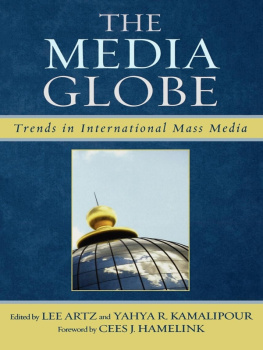
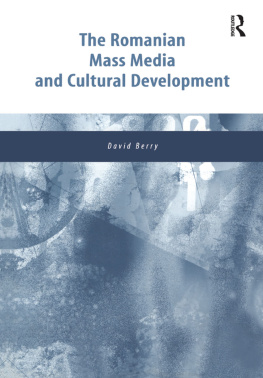
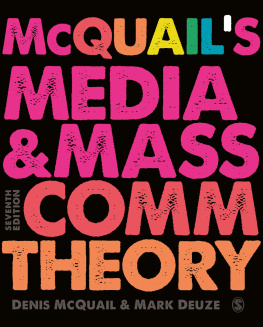
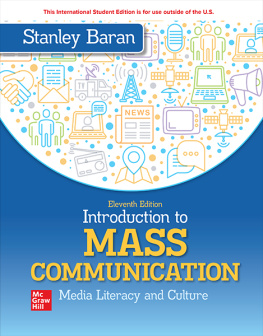
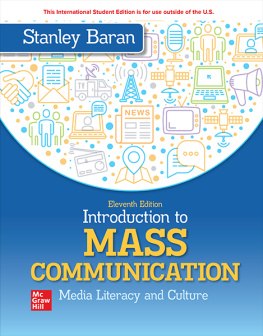

 The paper used in this publication meets the minimum requirements of American National Standard for Information SciencesPermanence of Paper for Printed Library Materials, ANSI/NISO Z39.48-1992.
The paper used in this publication meets the minimum requirements of American National Standard for Information SciencesPermanence of Paper for Printed Library Materials, ANSI/NISO Z39.48-1992.